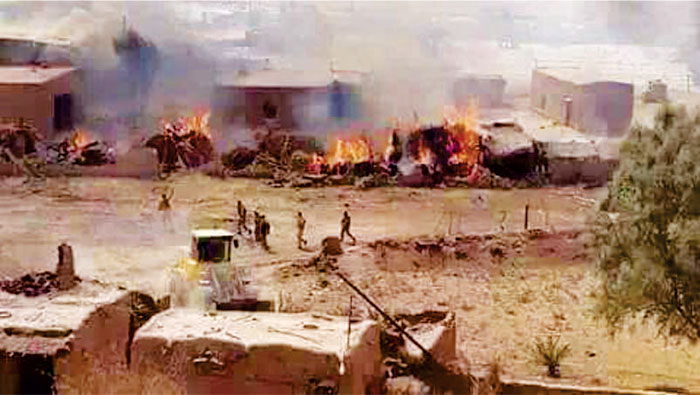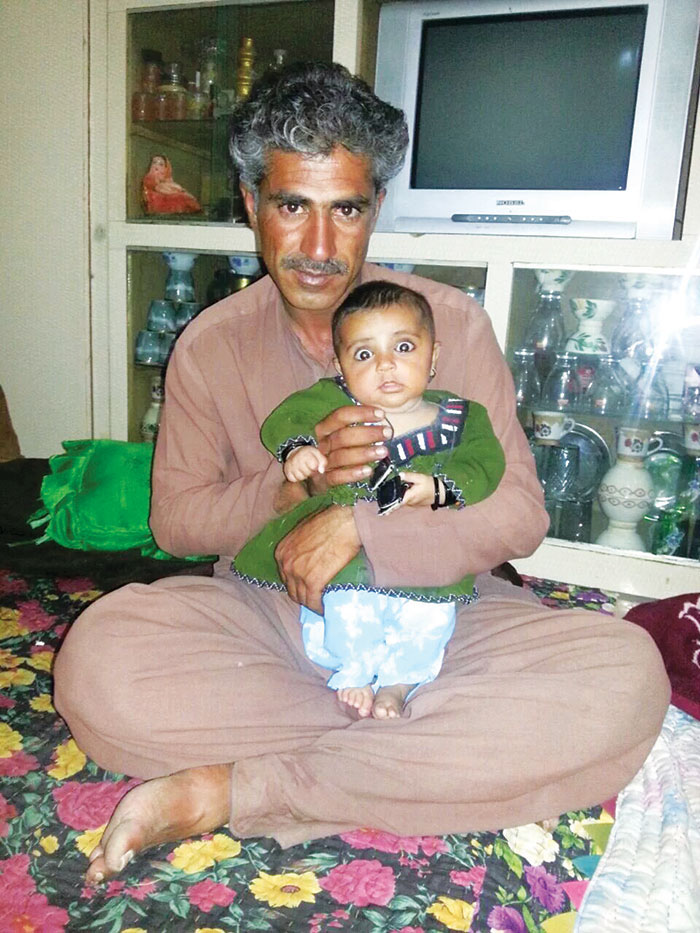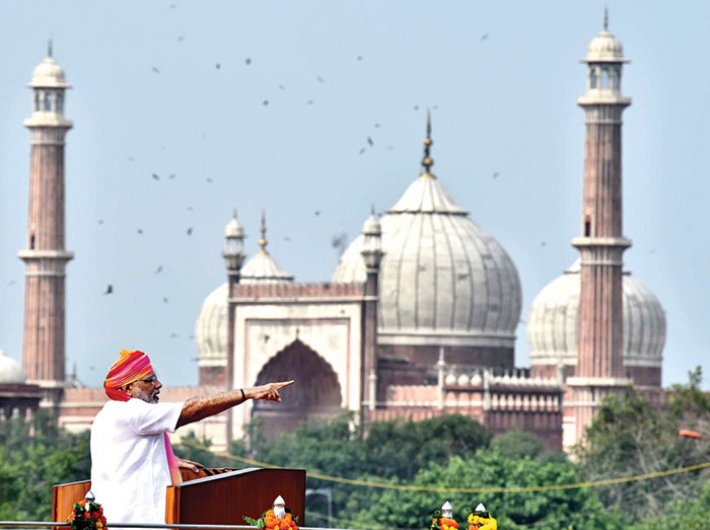The strategy behind the remarks that can radically alter geo-politics of South Asia
Prof Naela Quadri Baloch landed in New Delhi in April. Her mission was to canvass support of the Narendra Modi government for the independent Balochistan movement. Naela used to teach pharmacy in the University of Balochistan, Quetta – till that day in 2010 when she learnt that the Pakistan army was planning to kill her family in Quetta in a bomb attack, the way it had killed one of the most respected Baloch leaders, Nawab Akbar Bugti, in 2006. Overnight Naela, her filmmaker husband, Mir Ghulam Mustafa Raisani, and children crossed the border and moved to Afghanistan. The family took shelter with the United Nations High Commissioner for Refugees (UNHCR) and later moved to the West where they were received as political asylum seekers.
Baloch movement leaders, many of whom are expatriates, likened Naela’s visit to a historic liaison between Baloch leader Mir Ghus Bax Bizenjo and India’s first prime minister Jawaharlal Nehru in 1947. Soon after partition, Bax had come to know that the newly created Pakistan was planning to annex Balochistan, and he had rushed his emissary to seek India’s help. Nehru, however, had refused point blank.
“It was after 70 years that a Baloch leader was approaching India with a similar request,” says a Baloch activist who is privy to the details of Naela’s visit. She interacted with the think tanks close to the government, met authorities in government and political parties, and travelled to many state capitals where she briefed political leaders and the media. Before her departure, Naela had said that the Indian government perhaps lacked political will to speak up for the people of Balochistan.

A Baloch village allegedly ravaged by the Pakistani army
But she was in for a surprise.
On August 15, prime minister Narendra Modi raised the pitch for the Baloch people, who are being oppressed by the Pakistan army. From the ramparts of the Red Fort, Modi thus smashed the myth that India was a soft power. He told the world that India cared for Baloch people, who have been suffering at the hands of Pakistan for decades. In his characteristic flamboyance, he even talked about Gilgit-Baltistan, which is part of the Pakistan-occupied Kashmir (PoK). This created a storm in Pakistan, which so far had been unabashedly sponsoring terrorism in Kashmir often putting India on the defensive. “Believe me, the Pakistan government is in a tizzy. They are so disturbed by India flexing just a small muscle,” says a Baloch leader, speaking on condition of anonymity.
When Naela was in India, the Pakistan government had dubbed her as a Research and Analysis Wing [RAW] agent – a charge that was unlikely to stick to one of the most well-known Baloch leaders who has an impeccable reputation as a global campaigner on gender parity too. In Balochistan, her campaign had led to sweeping changes in tribal laws against honour killings. Besides, Naela heads the World Baloch Women’s Forum. “Yes, the RAW are our brothers and we have no hesitation in asking for India’s help in our struggle,” was her brazen reply to the Pakistanis.
In the days after Modi’s remarks, Pakistan looked on the edge as its leaders blamed him for crossing the red line. However, an independent Pakistani writer, Yakub Khan Bangash, wrote in the Express Tribune on August 24 that Pakistan need to take the Indian policy change seriously. He wrote, “…the mention of Balochistan in Modi’s speech indicates that India is angling itself to make that equivalence. It also shows that India is now not averse to accepting that it has a role and say in Balochistan, and is ready to highlight it internationally. This does not augur well for Pakistan. Since the Baloch insurgency is older and more frequent than the Kashmir one, and since there are a myriad of issues in Balochistan, the fact that Kalat [one of the bigger feudal states comprising Balochistan then] acceded to Pakistan legally might just be considered a historical detail. Also, if India keeps talking about Balochistan, Pakistan’s energies might be easily repositioned to dealing with the fallout of that scenario, and the Kashmir dispute might fall on the back burner. India’s public relations are far better than Pakistan’s and with our international image Balochistan might become a millstone around our neck on the international stage too.”
It would be naïve to believe that Modi’s touching of Pakistan’s raw nerve – Balochistan – as a payback to its constant Kashmir rant and its open support for terrorism there was a rash thought. Mandarins of South Block always had hawkish plans to take on Pakistan in its game. But in the past India has only once demonstrated this side of its foreign policy – in fighting Pakistani forces in the erstwhile East Pakistan leading to the birth of Bangladesh.
Strategic affairs experts were waiting for this dramatic turn in India’s approach to the world at large and Pakistan in particular, following the talk of a ‘Doval doctrine’ being put into practice. The doctrine derives from two speeches of the PM’s national security advisor, Ajit Kumar Doval, whose professional career is an example of heroism and bravery in India’s spy world. Doval had spent five years as a spy in Pakistan and as a cobbler sitting in front of the Bhindranwale-controlled Golden Temple before the Operation Bluestar ended his reign. As head of the Intelligence Bureau (IB), Doval was good at keeping himself away from the limelight and media glare.
In his two speeches delivered as head of the think tank, Vivekananda International Foundation (VIF), before his current assignment, Doval had revealed his mind on key issue of the state’s responsibility towards its people and dilemma of doing the same within the ambit of morality. He clearly said that while a decision-maker could pursue the path of morality in his personal life, he need not do the same while deciding the long-term strategy for people’s good or the state’s security. He also decried the idea of a soft state and said weak states invite trouble rather than mitigate or combat it. “If you make a provocation, you are partly responsible. But if you are not able to exercise power, it is as good as not having it,” he was quoted as having said in one of his lectures.
His approach towards Pakistan is that, instead of being defensive, India has to be offensive and offensive-defensive in calling Islamabad’s bluff.
With such portents, it was likely that the Modi government was only waiting for the right opportunity to send shockwaves to Islamabad. The killing of Burhan Wani, a Hizbul Mujahideen terrorist in Kashmir, and Pakistan praising him as a great martyr and sending reinforcements of terrorists to foment trouble in Kashmir, came as a trigger.
“This time Islamabad should have realised that a different dispensation is sitting in Delhi. And they will get a different response,” says Alok Bansal, author of Balochistan in Turmoil: Pakistan at Crossroads (Manas Publications, 2009). Bansal is one of the directors of the India Foundation, a think tank headed by RSS-BJP veteran Ram Madhav. “Earlier there was no policy on Pakistan and now we have a policy,” he says.
Meanwhile, Madhav, who as BJP general secretary is in charge of Kashmir, refuses to draw a parallel between Pakistan’s constant K rant and Modi’s stand on Balochistan. He says, “India would never go to the extent [of supporting the Baloch] as Pakistan went [in supporting Kashmiri militants].”
However, sources say, Dr Jitendra Singh, the minister of state in PMO who belongs to Jammu and Kashmir, had emerged as Modi’s key ‘advisor’ on Kashmir. Singh, a diabetes specialist and a first-time MP, is known for his teach-Pakistan-a-lesson philosophy. In fact, within days of his being sworn in as minister, he had stirred a controversy in his troubled home state by saying that the Modi government was in favour of initiating a dialogue on Article 370. Recently he also spoke of flying the tricolour in PoK soon.
The near-unanimous support for Modi’s mention of the ‘B’ word by political parties, which otherwise look for opportunities to score brownie points over the BJP, indicates the homework done by Modi’s team. In fact, the Congress openly snubbed its senior leader Salman Khurshid for criticising Modi on this count.
Baloch national leaders have always seen India as a reluctant helper [see interview of one of them]. After the 1947 snub to the Baloch leadership, New Delhi had shown no interest in the anti-Pakistan struggle of the people there in the 1970s. Then, the Baloch had sought help from India which was seen as a great power for having defeated Pakistan and split it. By creating Bangladesh, India had proved Baloch leader Mir Ghus Bax Bizenjo’s point made at the time of the subcontinent’s partition that the Baloch should not be made to join Pakistan for the reason that they are Muslims.
“As such we have a low credibility with Baloch people, but this time we hope there will be no rethinking,” says Sushant Sareen, a fellow at the think tank VIF. “The prime minister has not interfered in Pakistan’s internal affairs; he has just made a statement on India’s concern on human rights violations in Balochistan. However, he has managed to set the cat among the pigeons.”
Sareen feels that Modi’s one-line statement doesn’t necessarily hold a clue to India’s future plan of action on Balochistan. Will the government go beyond extending “moral, political and diplomatic” support to the Baloch freedom fighters? “Ever since Akbar Bugti’s killing in 2006, the uprising in Balochistan has taken a serious turn. Globally, there has been a conspiracy of silence on the brutal repression of the Baloch by Pakistan and if India decides to raise the issue, it would definitely help their cause.”
Bansal says the background of Balochistan’s inclusion in Pakistan is the story of deceit by none other than Mohammad Ali Jinnah. The then ruler of Kalat, a central princely state in Balochistan, had employed Jinnah, a barrister, as a legal advisor, and Jinnah had promised him independence. However, Pakistan eventually annexed Kalat.
The Baloch people are a distinct ethno-linguistic community of handsome men and women, who have their origins in Aleppo, Syria. They speak three languages – two of which are part of the Indo-Aryan family and the third one, Brahui, is a linguistic wonder – a Dravidian language spoken so far away from south India, hinting at age-old links between these two regions.
Balochistan once had a thriving Hindu community whose numbers have dwindled to the extent that nobody knows or keeps a tab on their real headcount. Bugti, it seems, used to employ many of them as his trusted guards. According to Reema Abbasi, author of Historic Temples in Pakistan: A Call to Conscience (Niyogi Books, 2014), three of the best preserved Hindu temples – Hinglaj Mata Mandir at Lasbela, Kali Mandir at Kalat and Mahadev Mandir at Mastung – are in Balochistan.
Baloch freedom activist Mir Mazdak Dilshad Baloch told Governance Now that the private militia raised by the army was terrorising the remaining Hindus as well as Zikris, a sect of Muslims who follow Sufi Islam. Both Hindus and Zikris are staunch Baloch nationalists, he claimed.

Hasil, a resident of Awaran, [holding his daughter in this pic], was picked up by the army on Aug 22. His body was recovered two days later
“Pakistan had realised the strategic and economic importance of the region much earlier,” Bansal says on Islamabad’s plan. According to the Pakistan government’s website, 90 percent of the coal and gas from Balochistan is sent to the rest of Pakistan. The vast swathes of Balochistan have rich deposits of gold, copper, chromite, Barytes sulphur, marble, iron and high-quality onyx, and these parts have been given to Chinese firms for exploration and mining. In fact, the common name for LPG or cooking gas across Pakistan is ‘Sui gas’, after the place of its origin in Balochistan.
Bugti, who was killed in a blast carried out by the army in a cave where he was hiding with his guards, was fighting against the “loot” of the region’s natural resources by Pakistan with the Chinese help. China has invested $46 billion in building the Gwadar port on the Balochistan coast which gives Beijing access to the Arabian sea. However, a hostile Baloch and Pashtun population has made sure that the highway – China-Pakistan Economic Corridor (CPEC) – running through their territories – Balochistan, Khyber Pakhtunkhawa and Federally Administered Tribal Areas (FATA) – cannot be used. The CPEC is an ambitious project to give China access to the seas right from Kasgarh, an ancient trade centre and also bring economic prosperity to Pakistan.
Bansal says the brutalities unleashed by the Pakistan army in Balochistan can be judged from the fact that it uses incendiary bombs against the civilian population in violation of international conventions. “There are allegations of the use of chemical weapons as well but we haven’t got any concrete evidence so far.” He wonders how the world has chosen to ignore this.
The alienation of people of Balochistan from Pakistan is complete. It is also a perfect case of gross human rights violations to be raised at the United Nations. “India is not supporting an independent Balochistan and thereby challenging territorial integrity of Pakistan, but it is tactically raising the issue of human rights the same way the US is doing,” says Bansal.
India’s game plan of keeping Pakistan on the defensive on Balochistan is also fraught with some implications for our bilateral relations. “Right now, Balochistan, which is 47 percent of Pakistan’s land with just 5 percent population, lacks critical mass for breaking away into an independent state and therefore India cannot at the moment even think of creating a Bangladesh out of it,” says a senior government functionary.
Baloch leaders have limited expectations from India; they just want New Delhi to give pin pricks to Islamabad over human rights violations. They also want India’s help in expanding the campaign to other regions of Pakistan. “However, the geo-political situation in the region has changed. Once the US was propping up the Baloch leaders because it thought that an independent Balochistan would be a buffer for it in case Pakistan turned hostile or terrorists took over that country,” says Bansal. However, with the US resuming its relations with Iran, which, like Afghanistan, has a chunk of the original Balochistan territory, the American interest in Balochistan has come down.
India, he cautions, has to take care not to get involved in Balochistan to the level of annoying Afghanistan and Iran. Significantly, after India, Bangladesh and Afghanistan have also supported the Baloch struggle. Is this the beginning of the process of Pakistan’s isolation in South Asia? However, given the huge Chinese stakes in Pakistan and Balochistan, it remains to be seen as to how Beijing reacts if New Delhi goes too far in helping the Baloch movement.

